The Benefits of Combining Medication and Therapy in Addiction Recovery

Introduction
In addiction recovery, the journey to stability and sobriety is complex and multifaceted. Often, a combination of medication and therapy proves to be the most effective strategy for supporting individuals through this challenging process. This dual approach addresses both the physiological and psychological components of addiction, leading to more sustained recovery outcomes. This article delves into how medication and therapy synergize to create a more comprehensive recovery process, exploring their complementary roles, benefits, and evidence-based insights that underscore their effectiveness.
The Synergy of Medication and Therapy in Recovery
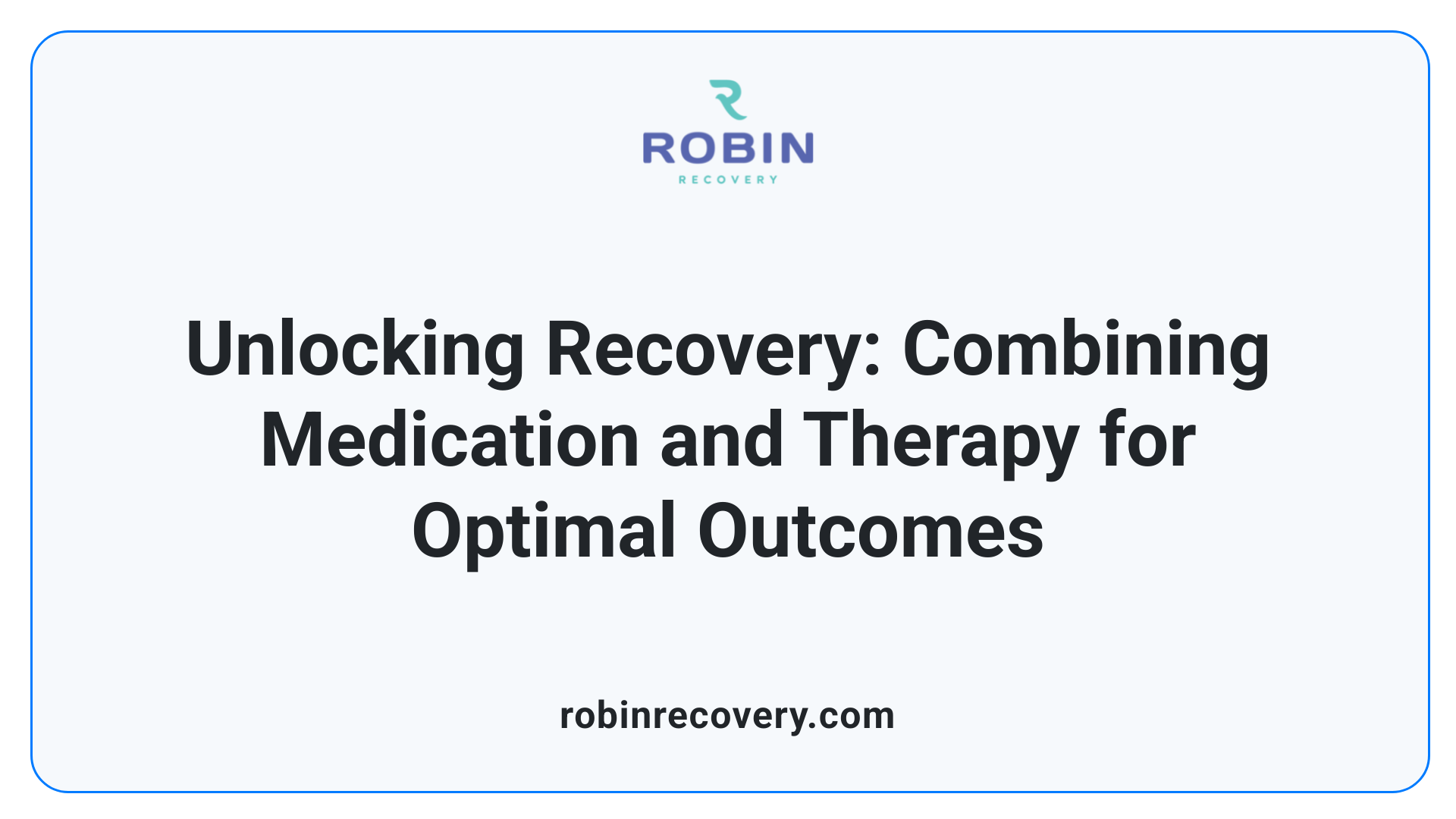
Introduction to the benefits of combining medication with therapy
Combining medication and therapy is pivotal in enhancing recovery outcomes for individuals struggling with addiction and mental health disorders. This integrative approach not only accelerates progress but also significantly improves the quality of life for patients. Studies reveal that individuals who engage in both therapy and medication demonstrate enhanced functioning across various life domains, leading to better long-term sobriety rates.
Holistic approach to addiction treatment
The importance of a holistic approach in addiction treatment cannot be overstated. Why should therapy be used alongside medication in addiction treatment? Therapy should be used alongside medication in addiction treatment because the two approaches complement each other effectively. While medication alleviates symptoms of mental health issues like anxiety and depression, enabling better engagement in therapy, therapy explores deeper issues and problematic beliefs without overwhelming patients with intense symptoms. This combination promotes awareness and fosters a sense of agency, which is crucial for personal growth and positive life choices.
Furthermore, discussing medication concerns within a therapeutic context offers essential emotional support, helping individuals address fears or embarrassment. The partnership of therapy and medication leads to more effective treatment outcomes, as it addresses both psychological and physical aspects of addiction, ultimately supporting sustainable recovery.
ComponentRole in RecoveryBenefits Medication Alleviates symptoms like cravings and withdrawal Reduces relapse, enhances effectiveness of therapy Therapy Provides coping strategies and emotional support Helps address deeper psychological issues Combined Approach Integrates treatment methods for comprehensive care Leads to better long-term outcomes and recovery
This synergy can create a fulfilling path toward recovery, helping patients reclaim control of their lives.
Evidence-Based Success in Dual-Treatment Approaches
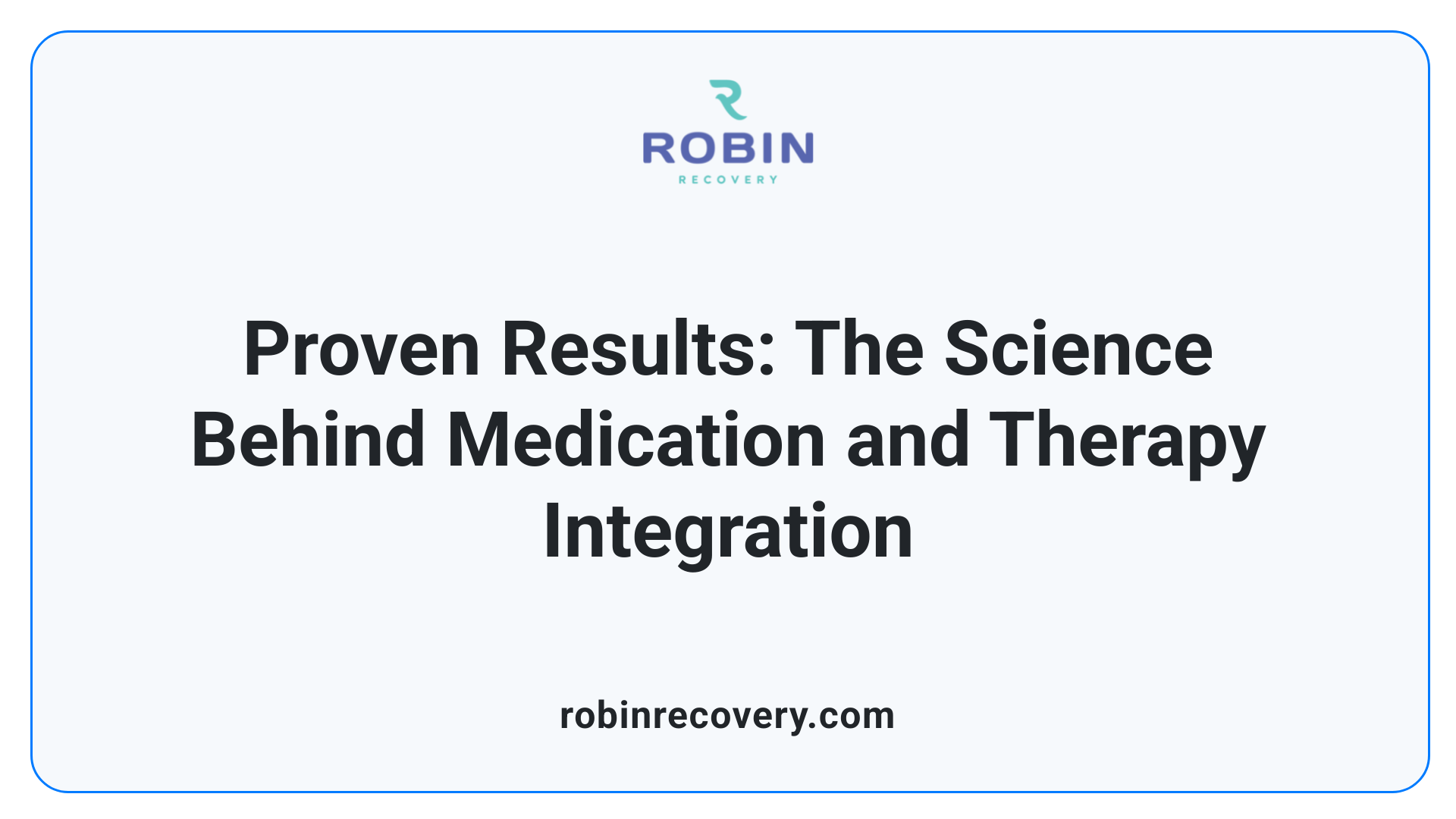
Research Supporting Medication and Therapy Combination
Combining medication and therapy has gained recognition for its effectiveness in treating various mental health disorders. Research shows that patients with depression, anxiety, and bipolar disorder exhibit improved functioning and quality of life with dual approaches. For instance, a meta-analysis covering 153 trials and nearly 30,000 participants found that integrating psychotherapy with pharmacotherapy significantly outperformed either treatment alone. This combination not only enhances treatment adherence but also results in better long-term recovery outcomes.
The benefits of combining these approaches extend beyond mental health. Patients with substance use disorders, particularly those undergoing Medication-Assisted Treatment (MAT), find that the blend of FDA-approved medications and counseling can effectively manage cravings and withdrawal symptoms. This integrated care model targets both psychological and physiological aspects of addiction, facilitating a more robust recovery process.
Study Outcomes Highlighting Effectiveness
Studies have consistently indicated that patients receiving a combination of psychotherapy and medication report higher rates of treatment retention and lower relapse rates. For example, in treating opioid use disorder, combining medications like methadone with behavioral therapies has demonstrated a marked reduction in illicit drug use and overdose occurrences. Additionally, clinical outcomes show that medications such as buprenorphine and naltrexone help normalize brain chemistry, enabling patients to engage meaningfully in counseling, focus on recovery, and achieve sustained sobriety.
Overall, these findings strongly support the recommendation to include both therapeutic and pharmacological interventions in treatment plans. The integration of these modalities not only meets individual patient needs but also addresses the complex nature of addiction and mental health disorders, leading to significantly improved overall recovery outcomes.
Unveiling the Benefits of Integrated Treatment
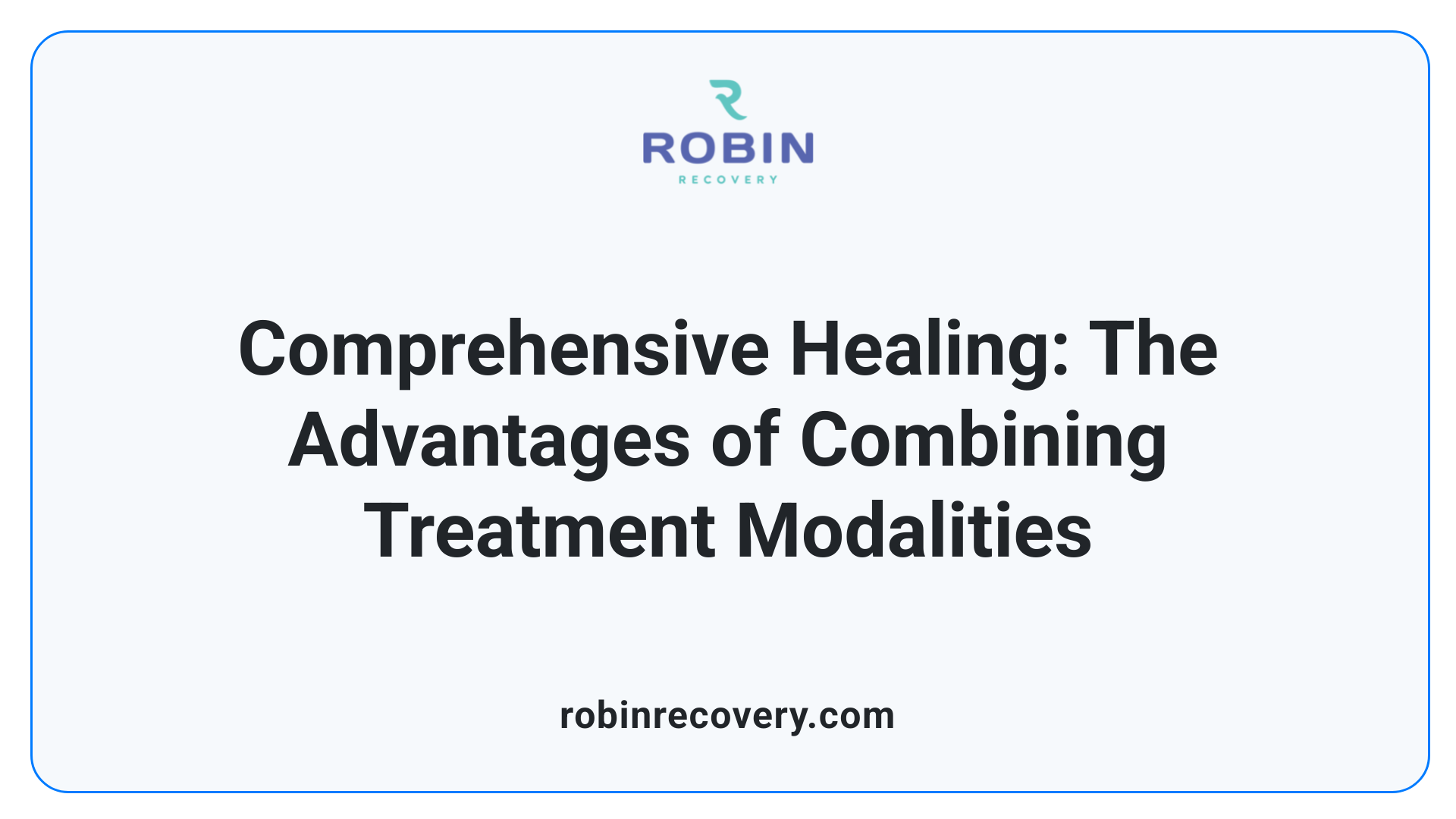
What are the benefits of combining medication and therapy?
Combining medication and therapy offers numerous benefits that enhance overall treatment effectiveness for mental health issues. This dual approach can significantly reduce relapse rates and help manage symptoms such as depression, anxiety, and substance use disorders.
Improved recovery outcomes
Therapy fosters self-awareness and personal growth, allowing individuals to examine their behaviors, triggers, and emotions. Simultaneously, medication provides necessary symptom relief and emotional regulation support. By stabilizing mood and reducing withdrawal symptoms, medication allows individuals to focus more on therapeutic work, thereby leading to better outcomes in addiction recovery.
Reducing relapse rates with combined therapies
Studies indicate that patients participating in both medication and therapy witness improved quality of life and reduced relapse rates. For instance, patients with depression show enhanced functioning in various life areas when utilizing this integrated approach. Furthermore, patients with bipolar disorder benefit from tailored therapy alongside medication, which helps maintain treatment adherence and social functioning.
Overall synergy of integrated approaches
The synergistic effect created by combining these modalities addresses both psychological and physical aspects of mental health, leading to substantial improvements in recovery and overall quality of life. This integrated treatment strategy not only destigmatizes the use of medications but also emphasizes their validity and importance in treating mental health conditions. Regular professional oversight ensures that medication is prescribed appropriately, maximizing the potential for successful outcomes.
The Complementary Roles in Addiction Rehabilitation
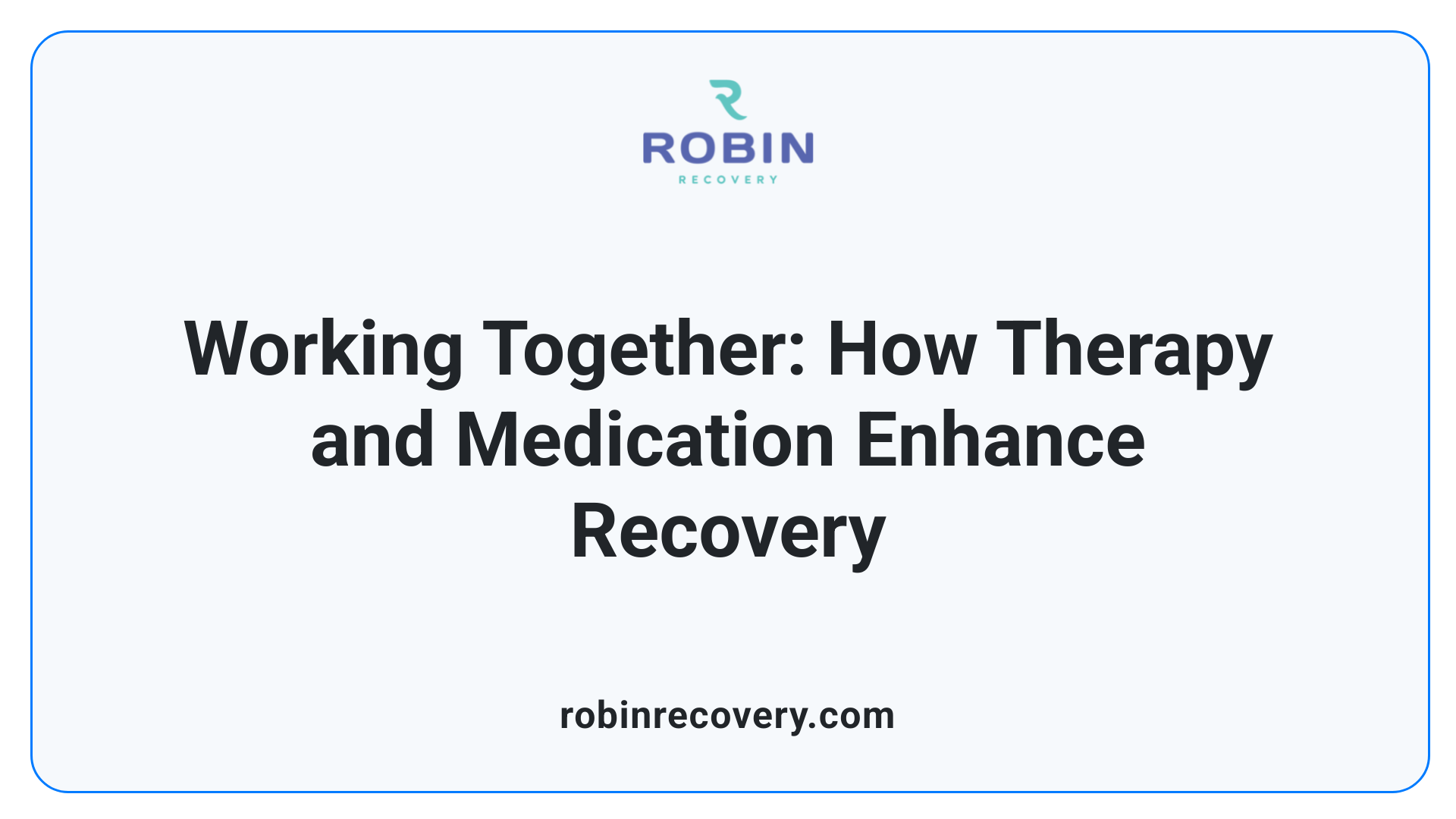
How do various treatment methods like cognitive behavioral therapy and pharmacotherapy complement each other in addiction recovery?
Various treatment methods, such as cognitive behavioral therapy (CBT) and pharmacotherapy, work together effectively in addiction recovery by addressing both psychological and physiological factors related to substance use disorders.
Research indicates that integrating CBT with pharmacotherapy, specifically medication-assisted treatment (MAT), yields improved outcomes compared to standard care alone. While pharmacotherapy helps reduce withdrawal symptoms and cravings with medications like buprenorphine and naltrexone, CBT plays a crucial role in helping patients identify and modify negative thought patterns and behaviors driving their substance use.
Additionally, CBT techniques, such as relapse prevention and contingency management, further enhance the recovery process. These strategies equip individuals with the necessary skills to handle high-risk situations and promote positive behaviors like maintaining sobriety. For instance, contingency management incentivizes clients for abstaining from drug use, reinforcing their commitment to recovery.
Role of therapies such as CBT and DBT
Therapies such as CBT and Dialectical Behavior Therapy (DBT) are indispensable in comprehensive addiction treatment. CBT focuses on changing harmful cognitive patterns, improving coping strategies to deal with triggers and stressors. In contrast, DBT emphasizes emotional regulation, fostering interpersonal effectiveness, and building resilience among individuals dealing with co-occurring mental health disorders.
The synergy between therapy and pharmacotherapy is evident through various studies showcasing that those receiving both modalities are more likely to achieve long-term sobriety. These therapies help not only in managing addiction symptoms but also in enhancing overall mental health stability, thereby improving the quality of life. Ultimately, an integrated approach to addiction treatment ensures that both the mental and physical challenges of addiction are addressed simultaneously, leading to more effective recovery outcomes.
A Closer Look at Medication-Assisted Treatment (MAT)
Overview of MAT
Medication-Assisted Treatment (MAT) is a comprehensive approach that combines FDA-approved medications with counseling and behavioral therapies. This method is particularly effective for treating substance use disorders, especially opioid use disorder (OUD) and alcohol use disorders. MAT addresses both the physical and psychological aspects of addiction, offering individuals a pathway toward recovery while managing withdrawal symptoms and cravings.
MAT is endorsed by major health organizations, including the American Medical Association and the National Institutes of Health, affirming its efficacy in helping individuals stabilize their mental health, engage more effectively in therapy, and ultimately achieve abstinence from substances.
Specific medications used and their purposes
MAT employs several key medications, each serving distinct roles in recovery:
MedicationTypePrimary PurposeMethadone Opioid agonist Reduces cravings and withdrawal symptoms for OUD. Buprenorphine Partial agonist Alleviates cravings and protects against withdrawal. Naltrexone Opioid antagonist Blocks the pleasurable effects of opioids and helps with cravings. Acamprosate Alcohol treatment Reduces cravings and helps maintain sobriety in alcohol use disorder. Disulfiram Alcohol deterrent Causes unpleasant reactions when alcohol is consumed, supporting abstinence.
By integrating these medications with ongoing counseling and support, MAT enhances the likelihood of sustained recovery and improved quality of life for individuals experiencing addiction.
Psychotherapeutic Strategies Enhancing Medication Outcomes
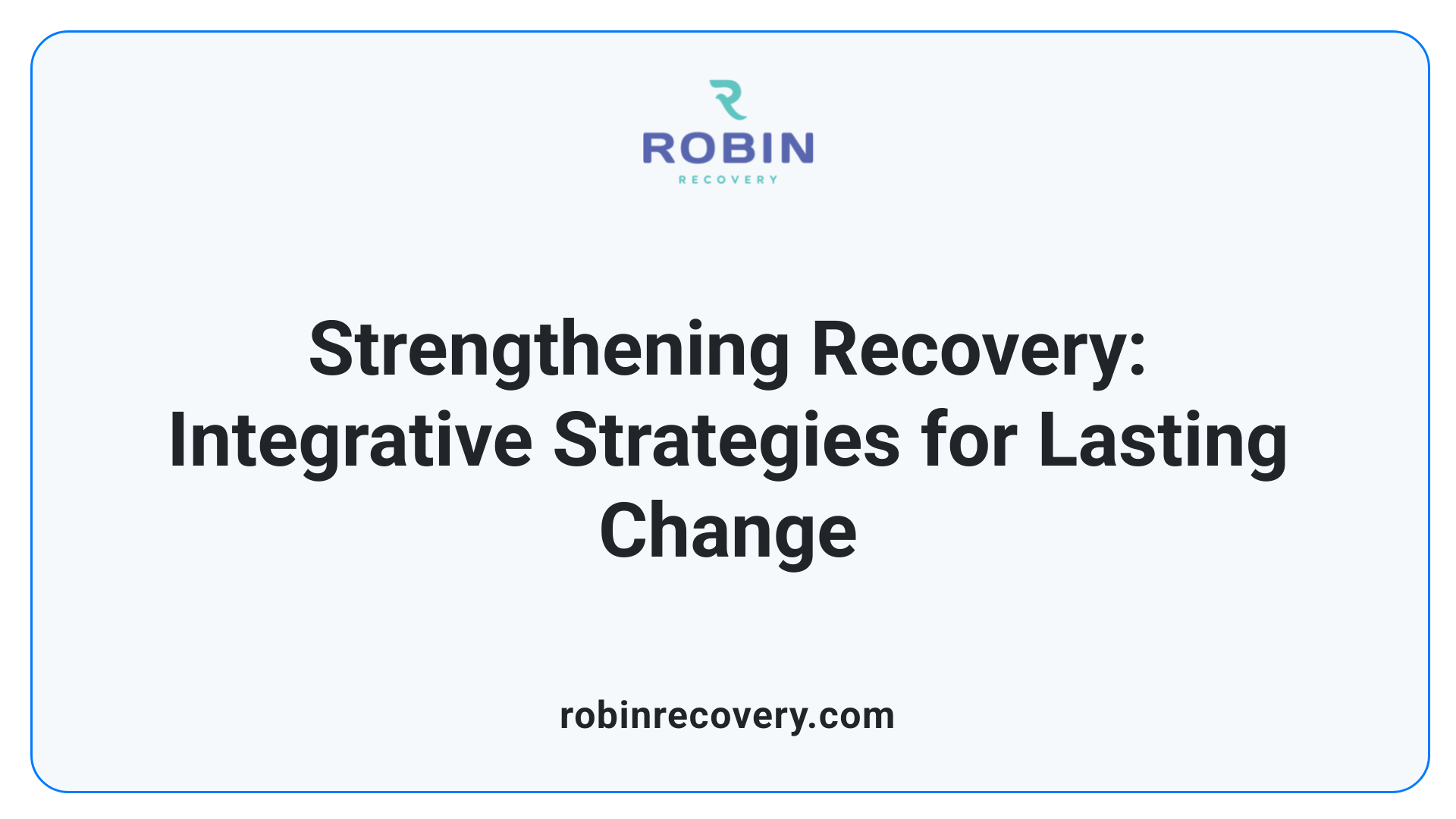
Types of Therapy Aiding MAT
Different therapeutic approaches complement Medication-Assisted Treatment (MAT) and enhance recovery outcomes. Key types of therapy include:
- Cognitive-Behavioral Therapy (CBT): Aims to change negative thought patterns that contribute to substance use, making it particularly effective for individuals with co-occurring disorders like depression and anxiety.
- Dialectical Behavior Therapy (DBT): Focuses on helping individuals manage emotions and improve interpersonal effectiveness. This therapy is beneficial for those with borderline personality disorder or other emotional regulation issues.
- Motivational Interviewing (MI): Engages patients by addressing their ambivalence towards change, fostering a stronger motivation to adhere to treatment plans.
Emotional and Behavioral Skill-Building Techniques
Therapy also offers numerous skill-building techniques essential for sustained recovery, such as:
- Coping Strategies: Therapists work with patients to develop effective responses to triggers, helping to reduce the risk of relapse.
- Stress Management: Skills learned in therapy support emotional resilience, enabling individuals to face life's challenges without reverting to substance use.
- Relapse Prevention Planning: This proactive approach equips patients to identify high-risk situations and develop contingency plans, enhancing their ability to maintain sobriety.
By integrating these therapeutic strategies with medication, individuals participating in MAT benefit from a holistic recovery approach that addresses both their psychological and physical challenges.
The Comprehensive Care Model: Integrating Mind and Body
What are three potential positive outcomes of using both psychotherapy and medication therapy?
Three potential positive outcomes of using both psychotherapy and medication therapy include:
- Improved Mental Health and Symptom Relief
Combining these approaches often leads to a significant reduction in symptoms of anxiety and depression. Patients report feeling better overall when medication addresses immediate symptoms while therapy works through deeper issues. - Enhanced Coping Skills
Psychological therapies help individuals develop robust coping mechanisms. These skills can assist patients in dealing with stressors and triggers, ultimately promoting emotional resilience and reducing the likelihood of relapse in cases of addiction. - Better Quality of Life
Integrating medication and therapy contributes to an improved overall quality of life. Patients often regain a sense of control and joy in everyday activities, which can significantly positively impact their personal and professional relationships.
Real-life recovery success stories
Using an integrated care model illustrates its effectiveness in real-world scenarios. For instance, a patient battling opioid addiction found success in combining Medication-Assisted Treatment (MAT) with Cognitive-Behavioral Therapy (CBT). After participating in this dual approach, the patient reported not only cessation of substance use but also improved relationships and a stable job.
Another example involves individuals with schizophrenia who, with the support of medication and psychosocial therapy, sustained longer periods of remission. This combination ensured they were better equipped to handle daily challenges while minimizing recurrence of symptoms.
Such success stories underline the power of comprehensive care in health outcomes, showcasing how the combined approach truly addresses both mental and physical aspects of recovery.
Conclusion
The intersection of medication and therapy represents a powerful alliance in addiction treatment. By addressing both the mental and physical challenges of substance use disorders, this combinate treatment offers a promising path towards recovery. As research increasingly demonstrates, an integrated approach not only reduces relapse rates but also enhances quality of life. For anyone on the pathway to recovery, understanding and embracing the synergy between medication and therapy can pave the way to sustained healing and personal growth. By tailoring these treatment modalities to individual needs, healthcare providers can help foster more effective, long-lasting recovery journeys.
References
- Benefits of Combining Medications and Therapy - Highland Hospital
- The Importance of Therapy & Medication Management Together
- Combined Pharmacotherapy and Cognitive Behavioral Therapy for ...
- Medication and Psychotherapy in Addiction Treatment
- 5 Benefits of Effectively Combining Medication-Assisted Treatment ...
- A Combination of MAT and Behavioral Therapy - Cedar Recovery
- Combining medication and adjunct services for opioid use disorder
